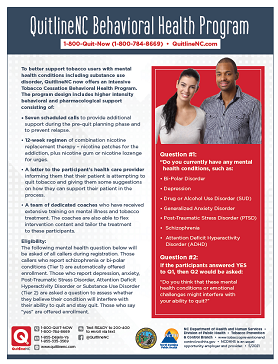People with Behavioral Health Disorders
Tobacco use is the number one preventable cause of death among those with
behavioral health disorders. On average, people with co-occurring
behavioral health disorders and tobacco-use disorder lose 25 years of
their lives due to tobacco use. In addition to the adverse health
effects from tobacco use, a number of studies show that smoking has been
found to be predictive of future suicidal behavior among youth and
adults independent of depressive symptoms, prior suicidal acts and other
substance use. It is important to note that there is evidence that
quitting smoking appears to mitigate the risk.
However, people with behavioral health disorders can and want to become
tobacco-free. Becoming tobacco-free has significant positive effects on
behavioral health:
- For those with substance use disorders, becoming tobacco-free is
associated with increased likelihood of long-term abstinence from
other drugs; and
- Becoming tobacco-free has been found to have as much positive effect
on mood and anxiety symptoms as anti-depressant treatment.

 These are reasons why QuitlineNC offers a specialized protocol to those
who have a behavioral health condition and feel that it will affect
their ability to become tobacco-free. For more information, check
out this flyer about the behavioral health protocol (PDF, 800
KB). Here is a
brochure for your clients about the Behavioral Health Program. Here is the
brochure in Spanish.
These are reasons why QuitlineNC offers a specialized protocol to those
who have a behavioral health condition and feel that it will affect
their ability to become tobacco-free. For more information, check
out this flyer about the behavioral health protocol (PDF, 800
KB). Here is a
brochure for your clients about the Behavioral Health Program. Here is the
brochure in Spanish.
Resources
The following resources can help you to integrate tobacco-use
treatment into treatment for those with co-occurring
behavioral health conditions:
SAMHSA resources:
Tobacco-free policies help people become and stay
tobacco-free. Need help implementing a tobacco-free policy at your
behavioral health program? Contact your local
tobacco prevention and control regional manager.
Also, check out this infographic
from BHthechange.org, as well as the implementation guides from SAMHSA
in the links above.
Sources
1. Prochaska JJ, Das S, Young-Wolff KC. Smoking, Mental
Illness, and Public Health. Annu Rev Public Health. 2017;38:165–185.
doi:10.1146/annurev-publhealth-031816-044618